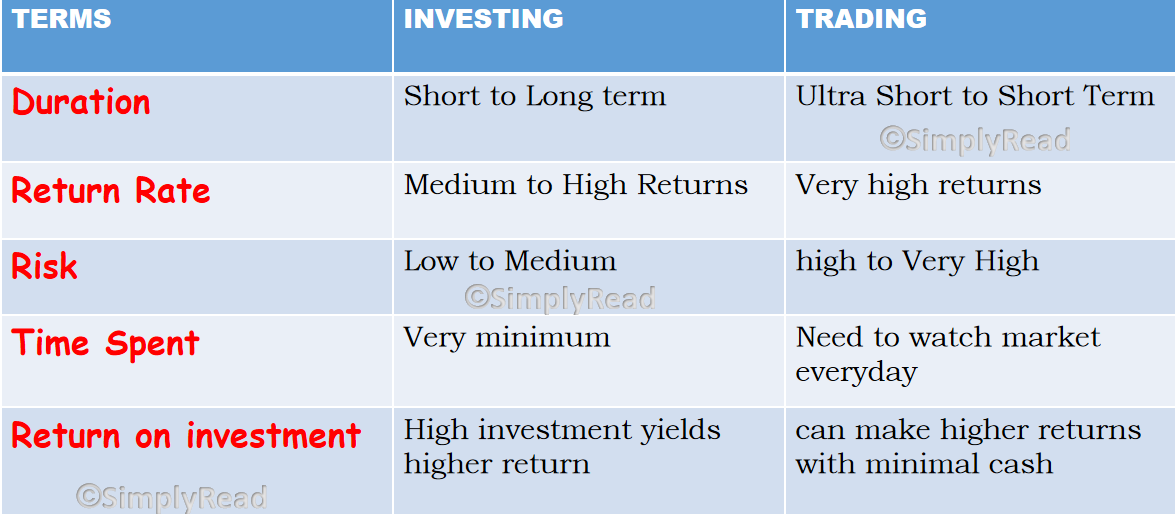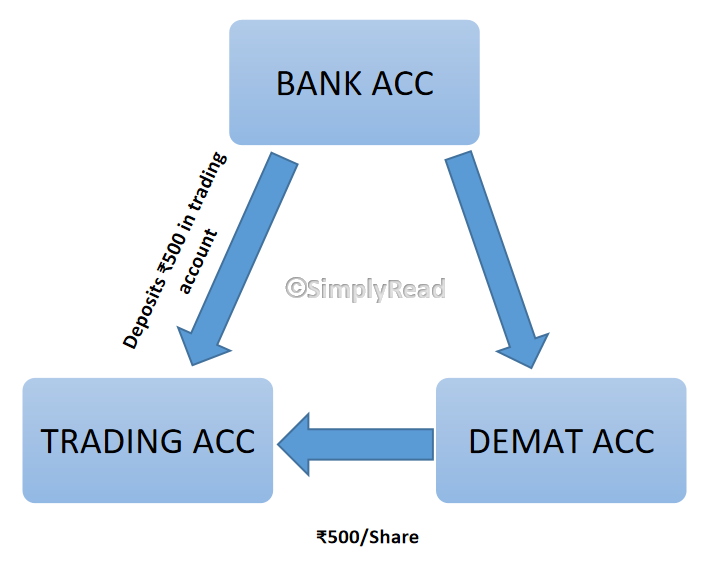Learning a skill is an art. Additionally, it needs a lot of hard work and a good mindset. Likewise, Trading is also a skill to be earned. Without any prior knowledge, one shouldn’t do trades. However, if you master trading, you will get a magnificent return within a very shorter period. It’s all in the mindset and decision-making skills. Here we are going to discuss the overview of trading and how to become a trader in stock market.
Dear reader, Welcome to SimplyRead! Yes, here things are So Simple!
WHO IS A TRADER?
In general, a trader is a person who buys and sells goods or raw materials continuously aiming for profits. Likewise, In the stock market, A trader buys and sells stock derivatives in a very short period to make profits. For example, buying 100 qty of Amazon stocks today and selling them on the same day. For trading options, the stocks will be available at a discounted price. Therefore, it’s a myth that you need a hell lot of money for trading. Click here to read about the myths of the stock market.
INVESTOR VS TRADER
An investor is a person who invests money in a security and waits for a longer time to reap the maximum profits. On the contrary, Trader aims to make greater profits in a very short duration. Let’s have a look at the below table for a quick understanding.

THE RIGHT MINDSET!
Becoming a trader is not an easy task. Moreover, it needs patience and skill. The trader should have the right mindset. Further, the Right mindset can be of controlling emotions. The trader must have awareness of losing money as well. Because some trades may end up in loss. However, The trader should aim to make a net profit and loss in a positive number.
Trades should be made only during favorable times and situations. It means whenever there is a right indication of a trend, trade can be made. Also, several factors need to be taken care such as overtrading, trading against the trend, taking rescue trade to catchup loss, etc. Fixing a goal for a trade would be advisable. For example, the goal can be of making 3% of the profit from daily trade.
SET UP
Similar to Investing, trading needs the following to kick start.
- Bank Account
- Demat Account
- Trading Account

Click here to know more about the Demat account.
A LITTLE KNOWLEDGE IS DANGEROUS!
Before starting a business, we need to gain deep knowledge about the business. Moreover, the proper analysis will be made on the challenges, risks, plans, returns, etc., of the business. Because without proper knowledge the business might end up in severe loss of funds. Likewise, Successful trading in the stock market can be made only after proper analysis. Read about technical and fundamental analysis of Stocks.
Only ~10% of Traders are successful in India
Also Read: stock market basics, Investment risk types, Invest in Gold, Equity Investment, Stock market invesment
TYPES OF TRADING
Trading can be classified into various types such as Intraday trading, stock options, stock futures, Index options, and index futures.
INTRADAY
Intra means “within”. Intraday trading refers to buying and selling stocks on the same day. Moreover, Intraday trading can give higher returns and be risky at the same time. The trader can buy or sell anytime during the live market hours. Sometimes, Intraday can be referred to as positional trading. Positional means carrying the stock derivates within a period and not holding it for the long term.
However, for intraday trading, the positions should be closed before the cut-off time. Cut-off time is the time at which the broker will square-off all the positions automatically. For example, If you buy 1000 shares of Tata motors, it will be shown as positions. If you fail to sell it before the cut-off time, the position will be automatically sold at market price.
In India, the cut-off time for Intraday Equity trading is 3:20 PM IST
OPTIONS
Options are derivative contracts that allow traders to buy and sell stocks or indexes at a discounted price. Usually, contracts are made to complete the work within the stipulated time. Likewise, In options trading, buying and selling should be made within the expiry date. Further, stock options have monthly expiry and Index options have both weekly and monthly expiry.
Equity option contracts are based on equity whereas Index options are based on Indices. For example, TataMotors Aug 500CE is an equity call option and Nifty Aug 14700CE is an Index call option. Similar to Intraday trading, options contracts will be auto squared-off on expiry date cut-off time.

FUTURES
Futures are derivate contracts that are bought and sold with the predetermined price for stock or index. Similar to options, futures also have monthly expiry. Equity futures are based on stocks or Equity whereas index Futures are based on Indices. To put it simply, A trader buys Amazon stock upcoming month’s future thinking that the stock will move to the desired strike price. Moreover, Strike price means the predicted target price.

For Example, NIFTY 25 AUG 2022 FUT represents the Nifty Index Future which has August expiry month. Moreover, this future contract can be bought and sold within 25th of August. Likewise, INFY 25AUG2022 FUT indicates the Future contract of Infosys which can be traded within 25th of August.
INDICATORS
The indicator is the technical tool used to indicate the stock price trend. Moreover, the indicator gives the signal for buying and selling, Volume, etc., Using indicators can help traders to make a quick decision while making a trade. There are a lot of indicators developed and available for trading. These indicators can be used in the broker-provided application or websites such as Trading view can help. However, the list of popular Indicators is as follows.
- Relative Strength Index (RSI)
- Moving Average Convergence Divergence (MACD)
- Bollinger Bands
- Alligator
- Stochastic oscillator
- Fibonacci retracement
- On Balance Volume (OBV)
- Accumulation/Distribution Line
- Average directional index
- Aroon
TO WRAP THINGS UP!
Hope this article have given a basic understanding of Trading in the stock market.
As always, Do your analysis before taking any trade. Are you ready to start a trade?
Thanks for Reading! So Simple!



1 comment